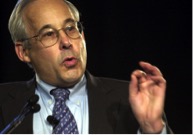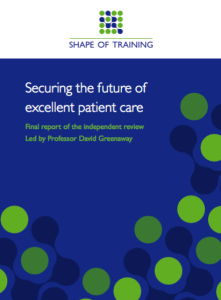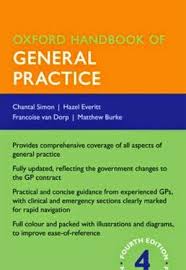The seven year itch
Seven years.  There were good times, and some not so good times. But mostly good. Now it’s over; time to move on. The seven year itch?
There were good times, and some not so good times. But mostly good. Now it’s over; time to move on. The seven year itch?
I started work as a GP principal in Lanarkshire in the late 90’s, and was a Trainee there before that.  After stints as a lead GP and Managed Clinical Network (MCN) lead, I became medical director in 2008.
After stints as a lead GP and Managed Clinical Network (MCN) lead, I became medical director in 2008.
I kept on a clinical commitment until work with Scottish Government beckoned and I became an SMO.
Now, after being appointed as Deputy Chief Medical Offier, I find myself leaving Lanarkshire completely.
Lacked ambition
So what? The point is this; when I was a Junior House Officer in a Glasgow teaching hospital, I was told I “lacked ambition” because I wanted to apply for the GP scheme rather than the medical rota. It’s not an accusation I’ve heard levelled at me again in my career, and I haven’t changed, and I don’t think that it was meant maliciously.  I had no interest in being any kind of doctor other than a GP.
I had no interest in being any kind of doctor other than a GP.
I’d seen positive role models in hospital medicine (Harry Gray, Jim McKillop, John Dagg…) but it was general practice where my heart lay, for a variety of reasons. It still does.
I’m proud of general practice in Scotland, and of the people I’ve worked with who are GPs. Yet too often I hear it being unfairly criticised or undermined, sometimes by my very own profession. An elitist snobbery still appears to exist in some quarters, just as I experienced; “if you don’t work hard and apply yourself, you could end up a GP”.
The jewel in the crown of the NHS
The healthcare system needs GPs and generalists.  The American health leader, Don Berwick who is one of my heroes (alongside Dave Grohl, but that’s another story) said at the NHS 60th anniversary celebrations:
The American health leader, Don Berwick who is one of my heroes (alongside Dave Grohl, but that’s another story) said at the NHS 60th anniversary celebrations:
“Reinvest in General Practice and Primary Care.
These, not hospital care, are the soul of a proper, community-orientated health-preserving care system. General Practice, not hospitals, is the jewel in the crown of the NHS. It always has been.
You must save it. And you must build it.”
Medical Generalism
In 2013, Professor David Greenaway emphasised in his report “Securing the Future of Patient Care” the importance of generalism and the need for experts in “whole person medicine”.  GPs are probably the most generalist of all medical specialties, with skills and an approach to care that provides our population with accessible, empathic doctors who recognise that not all symptoms need investigation, or treatment, but sometimes just explanation. This high quality, skilled risk management is fundamental to our ability to provide universal health care, and should be celebrated.
GPs are probably the most generalist of all medical specialties, with skills and an approach to care that provides our population with accessible, empathic doctors who recognise that not all symptoms need investigation, or treatment, but sometimes just explanation. This high quality, skilled risk management is fundamental to our ability to provide universal health care, and should be celebrated.
In their joint report with the Health Foundation, “Medical Generalism” the Royal College of General Practitioners Commission on Generalism described the ethos that lies behind it: not only seeing the person as a whole, but in the context of their family and their social environment, and using this perspective as part of the clinical approach, able to deal with undifferentiated illness, co-ordinating care across organisations and with responsibility across disease episodes and time.
The most rewarding care arena
That’s the vision of care that excited me so much as a medical student, and that’s what I hope we can awaken in our under-graduates and doctors in training who appear to be more reluctant to follow general practice as a career. The most rewarding care I provided was not at the high technical end of medicine, but was when these components coalesced, treating people with chronic conditions, alongside their families, often to the end of their lives. This personal investment, and what the patient brings to us, is best summed up in a passage at the end of the Oxford Book of General Practice:
 “Thanks to our patients we never stay the same. After practising medicine for a decade or so, our minds become populated by the ghosts of former patients, beckoning us, warning us, reminding us of the things that we cannot control – and the ideals to which we aspire.
“Thanks to our patients we never stay the same. After practising medicine for a decade or so, our minds become populated by the ghosts of former patients, beckoning us, warning us, reminding us of the things that we cannot control – and the ideals to which we aspire.
We are lucky to work in a profession in which experience counts for more than knowledge, and it is to augment this thirst for experience that we urge our readers to turn away from learning by rote; let us read novels cultivate our friends and travel far and wide – and try to keep forever curious, for then, if we are lucky, we stand to gain that priceless therapeutic asset; a rich and compassionate personality and we will be all the more inclined to reformulate this tiresome and inconvenient patient who now confronts us into a lovable series of imperfections, joined together by bits of glory”
General practice is a difficult job, and getting tougher. In my opinion, it’s one of the hardest to do well in medicine, especially when working flat out and full time, whilst taking care of the business, the professional development and the governance at the same time. It should be valued more greatly than it is, because it provides the stable platform for everything else we do well in other medical specialties (and healthcare in general). So whilst I have a sentimental attachment to all that has gone before, I recognise that general practice needs to evolve, but in doing so retain its values and ethos.
Examining the role
That’s why I’m excited by the possibility that exists in the work with BMA Scotland and RCGP Scotland to examine the role of the GP of the future in Scotland, and how we make this a more attractive and sustainable career. We will have a new Scottish contract for general practice in 2017, and over the subsequent years move towards new ways of working together in multi-professional teams. We will have more training places than ever before for GPs, but we need to ensure that they’re filled.
It was my family doctor as a child, Dr. Ken Chisholm who inspired me to become a GP. And I came across many others who demonstrated values and behaviours that re-affirmed this throughout my career – from my trainers, David Dobbie and Murray Herbert, to my first senior partner Hamish Smart; and countless people since. Those of us who are able need to promote this alternative and positive view of general practice to excite and attract the next generation.
And that’s why I ask of you, to appreciate and marvel at the work done in general practice across Scotland every day, and to celebrate it, and respect it.
This week’s blog was by @gissymedman (Dr Gregor Smith), Deputy Chief Medical Officer, Scottish Government.
The longer I work in hospital, the more respect I have for what GPs do. Do you still work in general practice?
By: David Hill on November 21, 2015
at 18:37
Hi David- thanks for commenting. No, I’ve made the difficult decision to stop now as continuity was becoming very difficult for patients and partners. This is such an important part of general practice. I’ve locum-ed a bit since then but, for me, find it less satisfying.
By: Gregor Smith on November 21, 2015
at 19:25